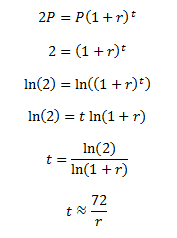You shouldn’t be Investing if you don’t know these 2 basics rules!


Published On: 18 April 2017 | 4:00 PM
All of us have different reasons as to why we started investing. Some of you might have read my previous article on “3 Reasons To Start Investing… NOW!” and in it, I mentioned about compound interest. I quote Albert Einstein, “Compound interest is the 8th wonder of the world. He who understands it, earns it… He who doesn’t… pays it.” But still, I don’t think many of us, especially those who are new to investing, understands the power of compound interest. It actually makes a huge difference to your investing goals. It can be the difference between becoming a millionaire today or 6 years later. Before I dive into the details, let’s start with a small quiz and see if you will change your answer at the end of this article.
The Rule of 72
If you are putting your money somewhere where you wished it will grow over time, this is the first rule that you should know. It’s a very simple rule. Basically, the rule of 72 estimates the amount of time required for you to double your money, with compound interest factored in. All you need to do is to take 72 and divide it with the annual rate of return. Say, for example, you buy a stock hoping for a 8% rate of return yearly. This will take you 72/8 = 9 years to double your money. If you started in 2017 with S$5,000, in 2026 that $5,000 would have grown to $10,000. And if you are a Math Junkie, here’s how the formula was derived.

M = Amount of money you have generated
P = Starting capital/principle
r = Annual interest rate (if interest rate is 8%, r = 0.08)
t = number of years
To double your investment, M = 2P. Hence,

There are analysis errors in this formula which I will not go into, but if your interest rate is between 6% to 10% you may use the rule of 72 safely. Below 5% there may be a 0.6-1 year error and above 10%, it is roughly about 0.3 years error.
But heck, 72 is good enough. After all, you just want to know roughly how long will it take to double your money. But here’s the thing, after explaining so much, you might say, “Ok, so what? How is compound interest so powerful?” Now, you’ll see the magic. Back to the question I asked at the start of this article, 3% or 4%. Apply rule 72 now. 72/3 = 24 years. 72/4 = 18 years. Do you see it? For just 1% difference in interest rate, it takes you 6 years longer to double your money.
This is the main reason why interest rates are always a hot topic. And remember, the rule of 72 doesn’t just apply to the growth of your money. It can be used during an inflation. If the interest rates go up by 6% a year, how long will it be before your money if worth half the value it is today? 72/6 = roughly 12 years. And even outside of the financial world, say you have 500 Facebook friends and you add 1 new friend a day. How long will it be before you double the number of friends you have? Or if the population growth rate of a country is x%, how long will it take for the population to double?
Phew. We are through with the difficult part. Hope you understand the power of compound interest now and why Albert Einstein said it’s the 8th Wonder of the world.
ADVERTISEMENT
The Rule of 100
Up next is a simple rule that you may use to check the amount of money you should invest in stocks. The Rule of 100 states that the percentage of stocks you should hold in your portfolio is 100 minus your age. So if you are 24 years old, 76% of your total investments should be in stocks and 24% in less risky assets. Read it carefully, it’s not 76% of the total money you have. It’s 76% of the money you have to invest. And if you’re 50 years old, only 50% of your total investments should be in stocks. The remaining 50% should be in safer asset classes. This is probably the best way to balance your portfolio and prepare for retirement. The only mistake one can probably make when using this rule is determining what is safe and what is not. Well, that depends on your risk appetite.
If you were to research deeper into this rule, many people have modified it to the rule of 110 or even 120. It’s simple to understand why. With the advancement of medical technology, people tend to live longer hence extending the number. Retirement age is also being extended. We used to retire at 55, now its 67. But again, lets keep it simple. We can just use 100. I’m never a fan of sticking 100% to a rule but I guess these can be guidelines as we start our investment journey.

GIF Source: GIPHY
Follow PhillipCapital on Facebook
Leave a comment
Related Articles
0% Comms Australia

SWEET! All new and existing clients can now trade Phillip’s Australia CFDs for FREE!. Yes, you read that right! For the entire month of April, you will be able to trade it without paying commissions…
#3 Facts - Australia Market

Many of you have probably heard the story of the 2 salesmen who went down to South Africa in the early 1900s. The first one came back and reported, “Situation hopeless, they don’t wear any shoes!”…
What is ETF Trading?

Markets are buzzing! Are you? The Dow Jones Industrial Average has been hitting new highs in 2017. Amidst all the news about the vibrant US Market, there is a little boy growing up behind the scenes called ETFs…
Intelligent Investor

As in the words of Peter Lynch, “If you don’t study companies, you have the same success buying stocks as you do in a poker game if you bet without looking at your cards.” I can say, almost certainly, that 80% of investors…
Losing Opportunities?

Confused when to exit a trade? Not sure if you should take profit? Here we discuss a trading strategy that you could always use in times of uncertainty. Never be left out on what is available for you.
Disclaimer
This material is provided to you for general information only and does not constitute a recommendation, an offer or solicitation to buy or sell the investment product mentioned. It does not have any regard to your specific investment objectives, financial situation or any of your particular needs. Accordingly, no warranty whatsoever is given and not liability whatsoever is accepted for any loss arising whether directly or indirectly as a result of your acting based on this information.
Investments are subject to investment risks. The risk of loss in leveraged trading can be substantial. You may sustain losses in excess of your initial funds and may be called upon to deposit additional margin funds at short notice. If the required funds are not provided within the prescribed time, your positions may be liquidated. The resulting deficits in your account are subject to penalty charges. The value of investments denominated in foreign currencies may diminish or increase due to changes in the rates of exchange. You should also be aware of the commissions and finance costs involved in trading leveraged products. This product may not be suitable for clients whose investment objective is preservation of capital and/or whose risk tolerance is low. Clients are advised to understand the nature and risks involved in margin trading.
You may wish to obtain advice from a qualified financial adviser, pursuant to a separate engagement, before making a commitment to purchase any of the investment products mentioned herein. In the event that you choose not to obtain advice from a qualifies financial adviser, you should assess and consider whether the investment product is suitable for you before proceeding to invest and we do not offer any advice in this regard unless mandated to do so by way of a separate engagement. You are advised to read the trading account Terms & Conditions and Risk Disclosure Statement (available online at www.poems.com.sg) before trading in this product.
Any CFD offered is not approved or endorsed by the issuer or originator of the underlying securities and the issuer or originator is not privy to the CFD contract. This advertisement has not been reviewed by the Monetary Authority of Singapore.



